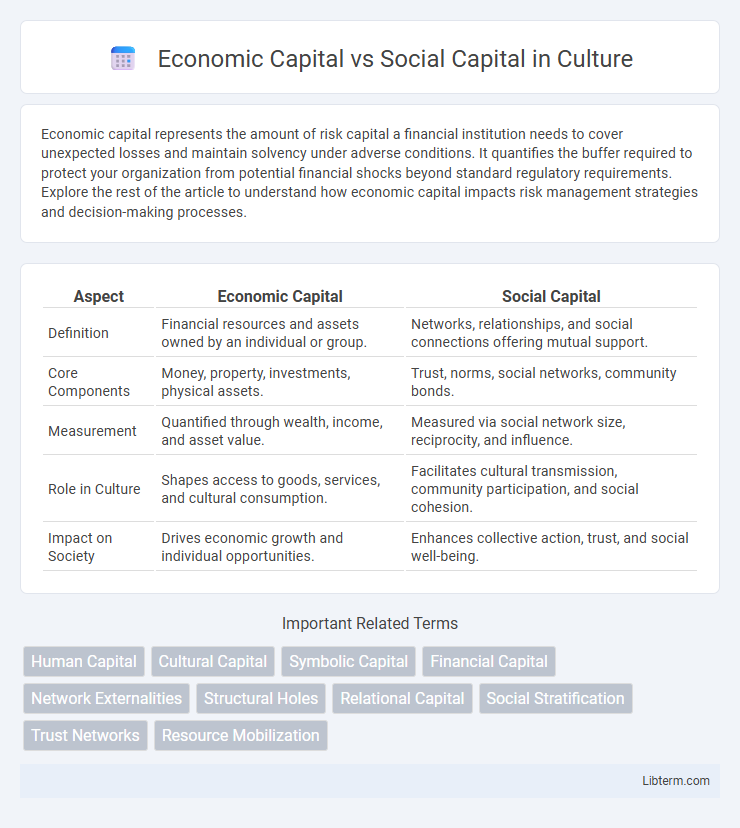Economic capital represents the amount of risk capital a financial institution needs to cover unexpected losses and maintain solvency under adverse conditions. It quantifies the buffer required to protect your organization from potential financial shocks beyond standard regulatory requirements. Explore the rest of the article to understand how economic capital impacts risk management strategies and decision-making processes.
Table of Comparison
| Aspect | Economic Capital | Social Capital |
|---|---|---|
| Definition | Financial resources and assets owned by an individual or group. | Networks, relationships, and social connections offering mutual support. |
| Core Components | Money, property, investments, physical assets. | Trust, norms, social networks, community bonds. |
| Measurement | Quantified through wealth, income, and asset value. | Measured via social network size, reciprocity, and influence. |
| Role in Culture | Shapes access to goods, services, and cultural consumption. | Facilitates cultural transmission, community participation, and social cohesion. |
| Impact on Society | Drives economic growth and individual opportunities. | Enhances collective action, trust, and social well-being. |
Introduction to Economic and Social Capital
Economic capital refers to tangible assets such as money, property, and financial resources that can be used to generate wealth and support business operations. Social capital involves networks, relationships, and social interactions that facilitate cooperation and access to resources within a community or organization. Understanding both forms of capital is crucial for leveraging financial assets alongside social connections to achieve sustainable growth and competitive advantage.
Defining Economic Capital
Economic capital refers to the financial assets and economic resources that individuals or organizations possess, including cash, investments, property, and other tangible wealth. It enables the generation of income, investment opportunities, and economic growth by providing the necessary funds to support business operations and personal wealth accumulation. Unlike social capital, which is based on relationships and networks, economic capital is quantifiable and directly linked to monetary value and financial power.
Understanding Social Capital
Social capital refers to the networks, relationships, and norms that facilitate collective action and cooperation within a community, enhancing trust and reciprocity among individuals. Unlike economic capital, which represents financial assets and tangible resources, social capital is intangible but crucial for fostering social cohesion and enabling access to information and support. Understanding social capital highlights its role in improving community resilience, economic opportunities, and overall societal well-being through strong interpersonal connections.
Core Differences Between Economic and Social Capital
Economic capital consists of tangible assets such as financial resources, property, and machinery that directly contribute to wealth generation and economic productivity. Social capital refers to the networks, relationships, and trust among individuals or groups that facilitate cooperation and enhance social cohesion. Core differences lie in economic capital's quantifiable financial value versus social capital's qualitative value in fostering community collaboration and collective action.
The Role of Economic Capital in Society
Economic capital represents financial assets, resources, and wealth that individuals or organizations utilize to generate income and influence social structures. It plays a critical role in shaping access to education, healthcare, and political power, directly impacting social mobility and inequality. By enabling investment in physical infrastructure and innovation, economic capital drives economic growth and societal development.
The Impact of Social Capital on Communities
Social capital significantly enhances community resilience by fostering trust, cooperation, and shared values among members, which leads to stronger social networks and collective problem-solving capabilities. Unlike economic capital, which relies on financial assets and resources, social capital leverages interpersonal relationships and social norms to improve community well-being and economic opportunities. Research shows that communities with high social capital experience reduced crime rates, better public health, and increased civic engagement, contributing to sustainable local development.
Interdependence of Economic and Social Capital
Economic capital and social capital are deeply interdependent, as financial resources often rely on networks of trust, norms, and relationships to be effectively mobilized and invested. Social capital facilitates access to economic opportunities by fostering cooperation, information exchange, and collective action within communities and organizations. Strong social networks enhance economic capital accumulation by reducing transaction costs and enabling resource sharing across individuals and groups.
Case Studies: Economic vs Social Capital in Practice
Case studies reveal that economic capital, measured by financial assets and investments, drives business growth and market expansion, exemplified by tech startups leveraging venture capital for innovation. Social capital, defined through networks, trust, and community engagement, enhances organizational resilience and collaboration, as seen in cooperative enterprises thriving through collective action. Combining economic and social capital fosters sustainable development, with firms integrating stakeholder relationships to boost both profitability and social impact.
Strategies to Strengthen Both Capital Types
Strategies to strengthen economic capital include diversifying income streams, investing in education and skills development, and leveraging technology for business growth. Enhancing social capital requires building trust through consistent communication, fostering community engagement, and nurturing networks that facilitate collaboration and resource sharing. Integrating both approaches maximizes overall resilience and sustainable development by balancing financial assets with strong interpersonal relationships.
Conclusion: Building Balanced Capital for Sustainable Growth
Economic capital drives tangible assets, financial resources, and measurable returns essential for immediate business operations and growth. Social capital fosters trust, collaboration, and networks that enhance innovation and long-term community resilience. Balancing economic and social capital creates a sustainable framework that supports enduring prosperity and adaptive capacity in dynamic markets.
Economic Capital Infographic

 libterm.com
libterm.com